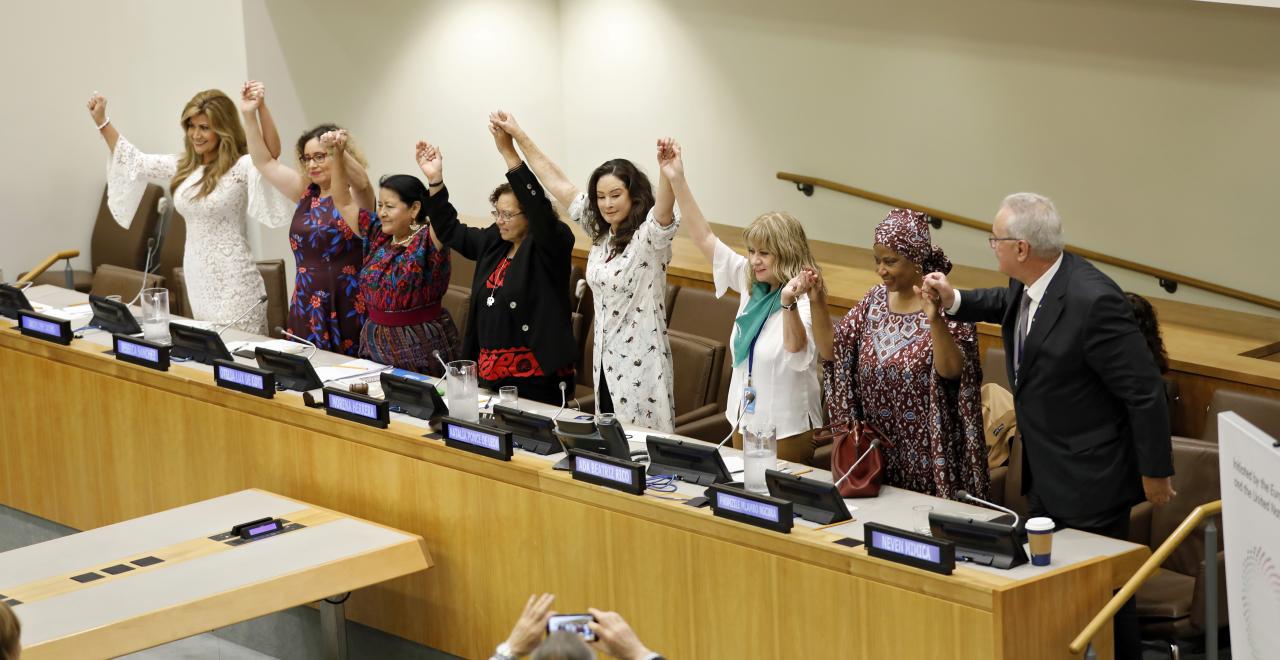European Union and United Nations join forces to end femicide in Latin America under the Spotlight Initiative

The European Union and the United Nations are announcing today a €50 million investment to end femicide in Latin America.
Femicide claims the lives of 12 women in Latin America every day.
With today's €50 million financial contribution, the EU-UN Spotlight Initiative will fund new and innovative programmes in Argentina, El Salvador, Guatemala, Honduras, and Mexico, to help women and girls live lives free from violence and to eradicate femicide in Latin America.
“No woman should die because she is a woman.” - UN Deputy Secretary-General Amina J. Mohammed
“Addressing the issue of femicide comprehensively from multiple angles is essential to successful and lasting results,” said UN Deputy Secretary-General Amina J. Mohammed. “No woman should die because she is a woman.”
"Ending violence against women and girls is on top of our agenda. With the Spotlight initiative, we have a global coalition around this objective and are mobilising all efforts and actions in education, awareness raising, prevention and delivering justice," said High Representative/Vice-President Federica Mogherini. "We want to make sure that women and girls never have to live in fear again, in Latin America, in Europe and around the world.
UN Deputy Secretary-General Amina Mohammed (l) and High Representative of the European Union for Foreign Affairs and Security Policy Federica Mogherini. Photo: UN Women/Ryan Brown
Killing a woman for being a woman is the most outrageous crime one can conceive,” said European Commissioner for International Development and Cooperation Neven Mimica. “We will work with governments and other partners to tackle the root causes of femicide, which are often rooted in patriarchal attitudes, misogyny, sexism and objectification of women.”
“Gender-based violence affects every single country, and women and girls everywhere.” - UN Women Executive Director, Phumzile Mlambo-Ngcuka.
“Gender-based violence affects every single country, and women and girls everywhere,” said UN Women Executive Director, Phumzile Mlambo-Ngcuka. “With the Spotlight Initiative, the EU and the UN are working to galvanize broad collaboration with focused intent, across UN agencies, civil society partners and governments, so as to end violence against women and girls once and for all.” The new programmes will address legislative and policy gaps, strengthen institutions, promote gender-equitable attitudes, and provide quality services for survivors and reparations for victims of violence and their families. Critically, programmes will strengthen and build women’s movements both in the five countries and across Latin America.
The Spotlight Initiative will work closely with civil society, UN agencies and governments of the five programme countries to provide comprehensive, high-impact interventions that can save women and girls’ lives. A special focus will be put on reaching women and girls that are most at risk of violence and whom traditional programmes do not reach leaving no one behind.
Latin America is home to 14 of the 25 countries with the highest rates of femicide in the world. In 2016, 254 women and girls were killed in Argentina, 349 in El Salvador, 211 in Guatemala, 466 in Honduras and 2,813 in Mexico.
For media inquiries please contact:
In New York: Koye Adeboye, +1 646 781 4768
In Brussels: Carlos Martin, +32 229 65322
BACKGROUND
The Spotlight Initiative is a global, multiyear partnership between European Union and United Nations to eliminate all forms of violence against women and girls. Launched with a seed funding commitment of €500 million from the European Union, the initiative represents an unprecedented global effort to invest in gender equality and women’s empowerment as a precondition and driver for the achievement of the Sustainable Development Goals.
In the framework of the 2030 Agenda for Sustainable Development, adopted at the United Nations General Assembly in September 2015, governments across the world committed to address all inequalities and forms of discrimination. The 2030 Agenda commits “to leave no one behind” - a commitment that no goal will be considered at achieved unless it is met for all segments of society, for everyone, everywhere, including those furthest behind. This unfortunately also includes millions of women and girls who still suffer in silence every day from different forms of violence and abuse.
Violence against women and girls
Violence against women and girls is one of the most pervasive consequences of inequality. It is rooted in unequal gender and power relations and is a widespread form of discrimination, manifesting in multiple forms across both public and private spheres. Women and girls are disproportionately subjected to violence, including femicide, sexual violence, intimate partner violence, trafficking, and harmful practices. Violence against women and girls is a violation of human rights that occurs at alarming levels across all countries and generations.
For women and girls who face multiple and intersecting forms of discrimination, the risks to experience violence are even greater, while responses and support systems are often not available, acceptable, accessible or of quality standards. For example, women and girls in certain stages of life (adolescents and older ages) may be overlooked in statistics and in designing laws, policies and programmes. Migrants and refugees and internally displaced persons may lack formal recognition by the State. Indigenous women and those from ethnic, racial and sexual minorities often face some of the highest levels of discrimination across social, political and economic dimensions. Women and girls with disabilities, those living in rural areas, among others, similarly face overlapping inequalities and situations of multiple disadvantage, explaining how and why certain groups are systematically left behind.
